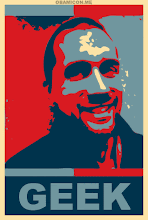TREND HUNTER
"An Intellectual Can of Red Bull", this Jeremy Gutsche fella seems like he's ready to rock and roll.
He opens with a question:
"It's not the questions that change, it's the answers that do." - Peter Drucker
"Why should I pick you? For eLearning...what is it you do?"
He references a Harley Davidson exec, and his response wasn't about the bike...it was about making someone be afraid of them. Steve Jobs wanted people to love the look and lick the buttons. Red Bull's CEO wanted people to embrace a state of mind. What's it all mean?
You are not selling a PRODUCT. You are selling an EXPERIENCE.
He shows an Old Spice commercial from the 60s, then shows a modern one...referencing that we were a 'bullet point' delivery culture, now? You knew it was a dollar from Shulton Labs back then...now? Who cares about the price, who cares about the lab...there is a sculpted man referencing every possible (stereotypical) dream a woman would want. That Old Spice is getting bought.
CHAOS = OPPORTUNITY
Fortune magazine was founded in 1929, three months after the Wall Street crash, priced three times more than the New York Times. They grew their subscribers to half a million during the Great Depression selling a magazine that was the price of a wool sweater. Why?
Decisions were being made in Manhattan that made that crash happened. This magazine gave a look behind the corporate curtain. And people wanted that. Peoples wants had CHANGED.
We're here for something different...something better. Somehow, we need to take what we do to the next level. We're currently experiencing history's greatest period of change.
"A company's culture is the seed to its destruction." In the 90's, a Kodak exec offered up the concept of a website that would share pictures of people's faces over the internet. Didn't happen. Bill Gates approached Britannica about digitizing their encyclopedias, they refused. He went to Funk and Wagnalls, they accepted - And we know that as Encarta. But even Gates, wise as he was, didn't connect the dots and charged for Encarta. We got together...and got Wikipedia.
SUCCESS LEADS TO COMPLACENCY
Success leads you to repetition...it kept food on our plate. Farm, harvest, do the same thing next year that worked. There's inspiration all around us, but we have to tap into it. Problem is, the act of being inspired has become distracting. And relying on gut instinct is problematic, so say the least. So how do we FIND BETTER IDEAS FASTER?
Jeremy covered his methods of innovation...crowdsourcing and crowdfiltering. Jeremy lost his dad a month ago, and mentions what an inspiration he was: A Charismatic Entrepeneur and kickass dad (Personal Note - Yes he was, Jeremy...we can see it in you.). Long way about, Jeremy was clearly inspired by his dad, took that inspiration, and grew it forward. Month old magazine subscriptions, door to door donuts, and a 16 year old night club owner...clearly Sig laid a path for Jeremy's inspiration and innovation.
TO MAKE A DIFFERENCE AT THE NEXT LEVEL:
- HUNT OVERLOOKED OPPORTUNITY
- KNOCK ON DOORS (PEOPLE ARE LAZY)
- SCOUR THE WORLD FOR IDEAS
(I'll admit...I stopped blogging and started listening. To encapsulate/summarize - His Dad taught him to look beyond the success of the moment. Look towards what could be done, not what needs to be done. Kind of awesomely emotional, he wrapped this segment with his dad's rules:)
SIG GUTSCHE'S LESSONS FOR SUCCESS
- Family first.
- Be genuinely interested in others.
- Be ambitious.
- Make people feel like they're a part of what you're doing.
- There is always upside in times of difficulty.
CULTURE EATS STRATEGY
Adaptive organizations:
- Change perspective
- Destroy intentionally
- Fail with purpose
- Are obsessed with their customers
The example: Smith Corona is "The BEST typewriter company in the world"...they still hold that title! "When you're successful, you don't need to change" When corporations fail, we focus more on absorbing/obtaining their customers rather than changing our own gig...we're focusing on doing what it was our failed competition was doing, rather than focusing on changing to ensure future success (or at least make an educated guess at what could garner it).
Per the Smith Corona CEO - If you use the term Buggy Whip, you're destined for failure. Smith Corona was poised to merge with Acer...it held on, too white knuckled, to what it was they DID. What happened? They went bankrupt, and Acer went on to be the 2nd leading laptop maker in the world. Change or die.(Gutsche goes on to expound his traits of adaptive organizations. Beyond engaging...emphasizes the importance of not just making emotional connections, but CULTURAL connections. Example: Iron Eyes Cody vs Don't Mess With Texas campaign (littering))
CONCLUSION
One of the quotes I'll take away is this: Situational framing dictates your outcome. There is no status quo...there is no reason to do today what we did yesterday, at least not completely. Culture needs to be read into, needs to be felt, needs to be embraced.
"There is no point of innovating if you think you already know the answer." It's time to STOP doing what we're good at. It's time to stop doing what we know and try to step into/be more open to the complete possibility of what could be. Make friends in other industries and begin to embrace what it is you don't know, rather than being afraid of what you don't.
For me? It's time to stop thinking I know it all, and realize I don't. Awesome, awesome, awesome keynote...what a great way to start the week.
Subscribe to:
Post Comments (Atom)


No comments:
Post a Comment